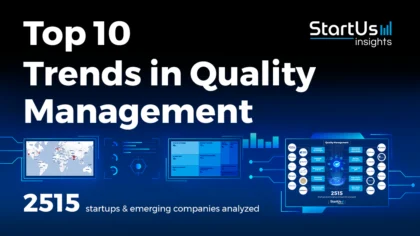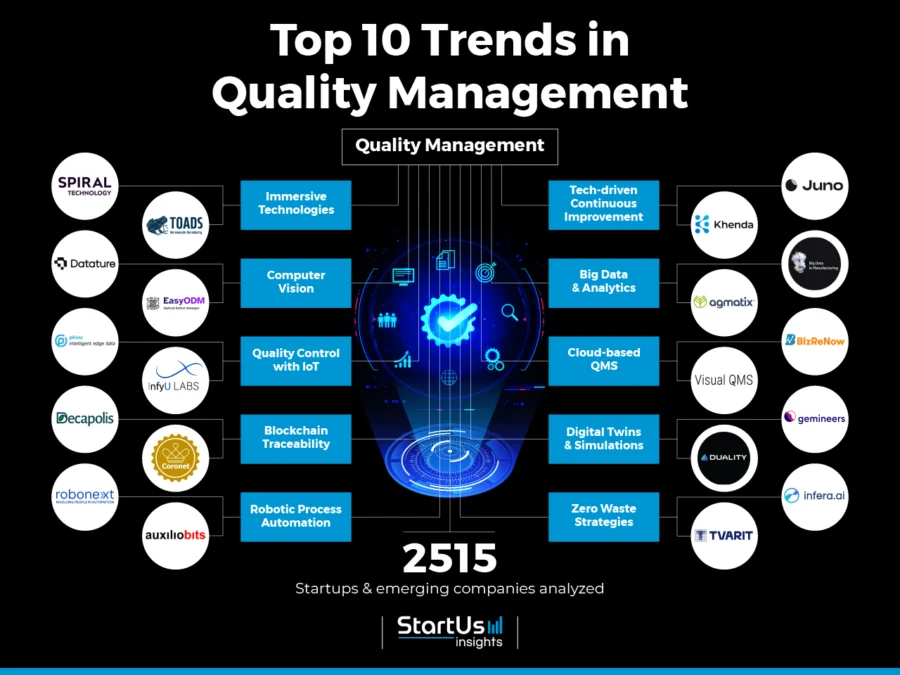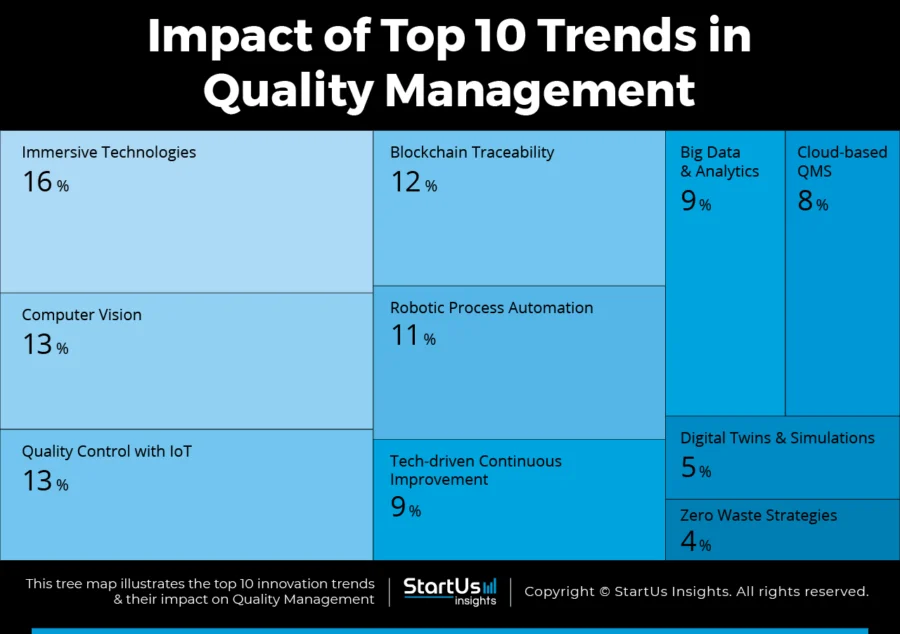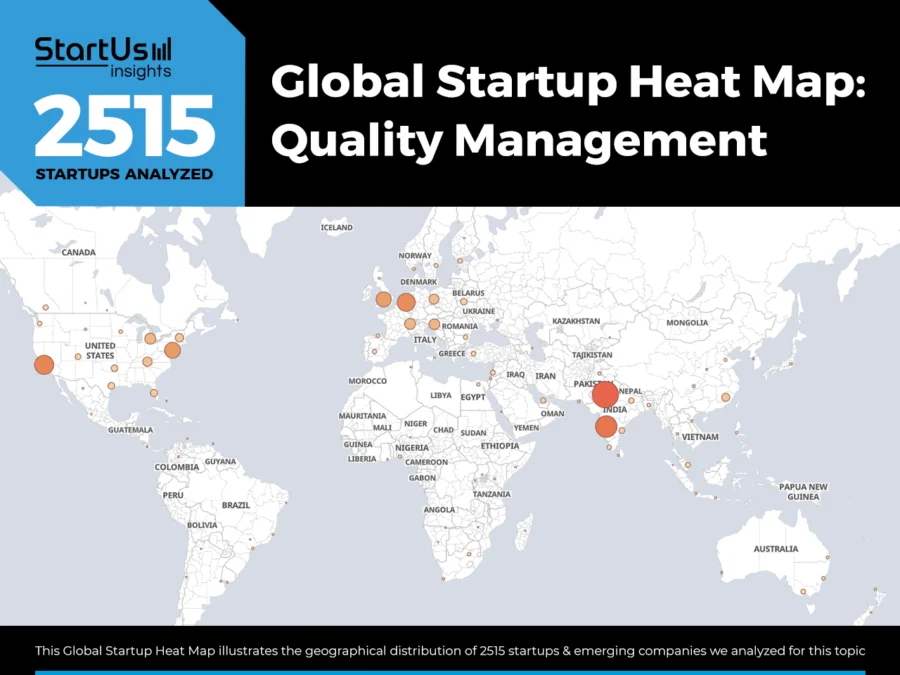Accelerate Productivity in 2025
Reignite Growth Despite the Global Slowdown
Increasing customer expectations demand higher product and service standards, making quality management critical to the success of organizations. At the same time, global supply chains add complexity and make it harder to monitor and control quality consistently along the entire product lifecycle. Innovations in quality management like machine learning (ML) enable predictive quality analytics.
Internet of Things (IoT) facilitates real-time monitoring of production processes and product environments, aiding in the immediate detection of anomalies. Read more to explore all trends in quality management and find out how you can use these technologies to reduce resource wastage and increase customer satisfaction.
What are the Latest Trends in Quality Management?
- Immersive Technologies
- Computer Vision
- Quality Control with IoT
- Blockchain Traceability
- Robotic Process Automation
- Tech-driven Continuous Improvement
- Big Data & Analytics
- Cloud-based QMS
- Digital Twins & Simulations
- Zero Waste Strategies
Methodology: How We Created the Quality Management Trend Report
For our trend reports, we leverage our proprietary StartUs Insights Discovery Platform, which covers and tracks nearly 5 million startups and technology companies worldwide, spanning all industries as well as 20 000 technologies and trends.
Creating a report involves approximately 40 hours of analysis. We evaluate our own startup data and complement these insights with external research, including industry reports, news articles, and market analyses. This process enables us to identify the most impactful and innovative trends in the quality management domain.
For each trend, we select two exemplary startups that meet the following criteria:
- Relevance: Their product, technology, or solution aligns with the trend.
- Founding Year: Established between 2020 and 2024.
- Company Size: A maximum of 100 employees.
- Location: Specific geographic considerations.
This approach ensures our reports provide reliable, actionable insights into the quality management innovation ecosystem while highlighting startups driving technological advancements in the industry.
Innovation Map outlines the 10 Current Trends in Quality Management & 20 Promising Startups
For this in-depth research on the Top 10 Quality Management Trends & Startups, we analyzed a sample of 2515 global startups & scaleups. The Quality Management Innovation Map created from this data-driven research helps you improve strategic decision-making by giving you a comprehensive overview of the quality management industry trends & startups that impact your company.
Tree Map reveals the Impact of the Top 10 New Trends in Quality Management
Based on the Quality Management Innovation Map, the Tree Map below illustrates the impact of the Top 10 Recent Trends in Quality Management in 2025. Startups and scaleups are developing technologies that reduce the complexity of quality management processes. These include IoT and immersive technologies that enable interactive experiences, better visualization, analysis, training, and communication. Other technologies like computer vision, digital twins, big data, and analytics deliver data-driven insights for improving quality management.
Global Startup Heat Map covers 2515 Quality Management Startups & Scaleups
The Global Startup Heat Map showcases the distribution of 2515 exemplary startups and scaleups analyzed using the StartUs Insights Discovery Platform. It highlights high startup activity in India, followed by the US. From these, 20 promising startups are featured below, selected based on factors like founding year, location, and funding.
Want to Explore Quality Management Innovations & Trends?
Top 10 Quality Management Trends [2025 & Beyond]
1. Immersive Technologies
Traditional methods in operator training struggle to realistically simulate scenarios and complex procedures for quality assurance. Another obstacle lies in inspecting and maintaining equipment, especially in remote or hazardous locations.
Over 3500 companies with annual revenues exceeding USD 200 million were estimated to invest heavily in AR/VR training modules last year.
Augmented reality (AR) and virtual reality (VR) systems mitigate these issues by providing interactive and immersive training environments. They enable hands-on practice without the risks associated with real-world scenarios.
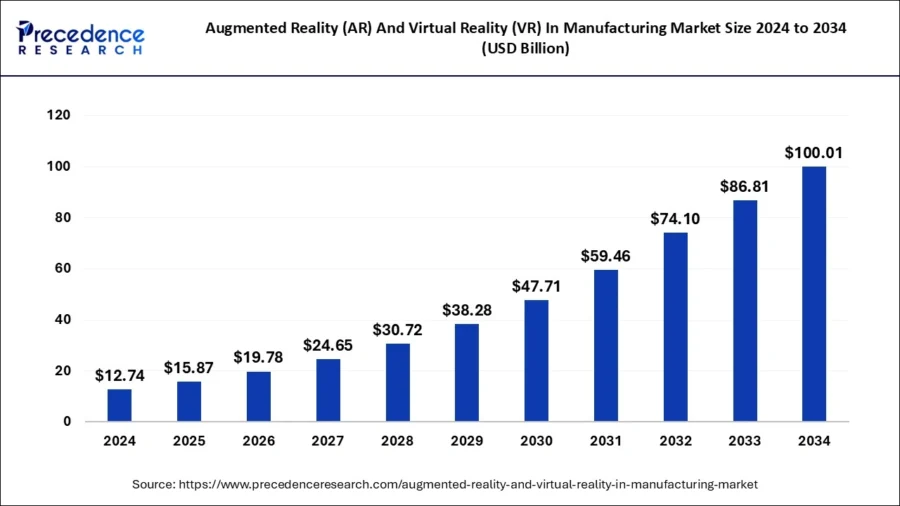
Source: Precedence Research
AR overlays digital information onto physical objects, aiding technicians in identifying faults and performing maintenance more efficiently. VR, on the other hand, enables experts to collaborate remotely with on-site personnel in real time.
This enhances problem-solving and decision-making capabilities. Immersive technologies thus improve the effectiveness of quality management processes and the performance of quality inspectors, reducing errors and enhancing overall product and service quality.
Spiral Technology simplifies Operator Training
US-based startup Spiral Technology offers an enterprise mixed reality (MR) platform for industrial automation. It provides visual step-by-step guidance for complex assembly tasks to ensure quality assurance. The platform applies machine learning to track the location/presence of the components and support quality control procedures.
This enables manufacturers to streamline workforce training for a wide range of processes and avoid reliance on operator memory. Spiral Technology’s MR platform benefits manufacturing processes like the production of composites, electronics assembly, or aerospace assembly.
Toads offers Online Pre-Inspections
South Korean startup Toads provides a digital pre-inspection solution that caters to industries like shipbuilding and construction. The startup’s platform extracts ship design models and information from CAD files to conduct pre-inspection.
It also supports pre-inspection meetings through online VR to collect found problems and request the required corrections. Toads’ platform allows collaboration among design managers, manufacturing managers, and quality control managers, avoiding and minimizing possible losses before manufacturing.
2. Computer Vision

Source: Market.Us
Manual inspection of products is time-consuming, error-prone, and subject to human biases. Moreover, identifying flaws with the naked eye is another challenge in complex manufacturing processes. Computer vision algorithms enable automated visual inspection to ensure consistent and accurate product quality assessments.
These automated inspections avoid the need for human presence and also increase inspection speed. Computer vision systems analyze vast amounts of data in real time, pinpointing even subtle defects and deviations from quality standards.
Additionally, such solutions aid in traceability by reading and processing barcodes or QR codes, and tracking products throughout the supply chain. Embracing computer vision technologies allows businesses to streamline quality management processes, reduce costs, enhance product reliability, and deliver higher-quality products.
For instance, Eigen Innovations secured USD 2.6 million last year to develop AI-enabled thermal inspection solutions for automated in-line inspections
EasyODM.tech enables Automated Visual Inspection
Lithuanian startup EasyODM.tech specializes in automated visual inspection software that leverages AI and computer vision. The startup’s software detects defects and ensures error-less production across industries like textile, glass, pharma, and wood.
The platform analyzes visual data and generates actionable insights with a high accuracy rate in defect recognition. The solution, in this way, optimizes production efficiency, minimizes defects, and reduces production costs.
Datature aids Vision-based Quality Management
Singaporean startup Datature develops a no-code AI vision platform for engineers deploying machine learning models for manufacturing assembly lines. It simplifies the workflow to annotate, train, visualize, and deploy computer vision models.
These vision modules facilitate processes like defect detection, assembly line monitoring, and workplace accident prevention. The startup’s vision platform allows faster training and deployment of vision modules, reducing the time and cost involved in implementation.
3. Quality Control with IoT
The lack of continuous monitoring systems creates a situation that hinders the consistent maintenance of quality across diverse production processes. IoT devices embedded in manufacturing equipment enable real-time data collection to avoid this issue. This approach allows businesses to track key performance indicators (KPIs) and ensure uniform product quality.
Another challenge lies in detecting defects and anomalies in real time, particularly in complex production environments. IoT-powered sensors identify deviations from quality standards immediately and trigger alerts to ensure rapid intervention.
Additionally, quality control with IoT enhances traceability by providing a transparent record of a product’s journey from raw materials to final product and end consumers. This empowers companies to address quality issues promptly and also improve consumer trust.
Thus, businesses streamline operations, reduce defects, and deliver products with higher levels of consistency with IoT-powered quality management.
phinc enables IoT-based Process Monitoring
German startup phinc builds IoT-based solutions to predict product quality and increase productivity. The startup’s sensor captures data from multiple equipment and streams the information to an edge device via cable. This includes both machine and process data.
The startup’s AI-based analytics then evaluates the data in real-time to identify process errors, prevent downtime, and optimize output. This offers production managers the foresight to make proactive decisions regarding quality improvement.
InfyU LABS aids in Fruit and Vegetable Quality Assurance
Indian agritech startup InfyU LABS offers IoT-based devices for quality assurance of fruits and vegetables. InfyZer is the startup’s hand-held and non-destructive testing (NDT) device to check the chemical composition of fruits and vegetables. This facilitates the automatic grading and sorting of fruits according to their chemical composition to fetch a high value in the market.
InfyQR is another solution that uses an embedded QR code to offer quality reports of the consignment. This provides retailers and end consumers with a transparent record of product quality. It also allows consumers to review the product, establishing trust between the buyers and consumers.
4. Blockchain Traceability
Blockchain technologies maintain transparency and trust throughout the supply chain, especially in industries where complex networks of suppliers are involved. It enables an immutable and decentralized ledger to ensure seamless traceability of raw materials and end products.
This ensures that every step of the production and distribution process is recorded and verified, reducing the risk of counterfeit or substandard products.
The global blockchain for supply chain traceability market is projected to reach USD 3.88 billion in 2025, with a long-term CAGR of 31.5% through 2037.
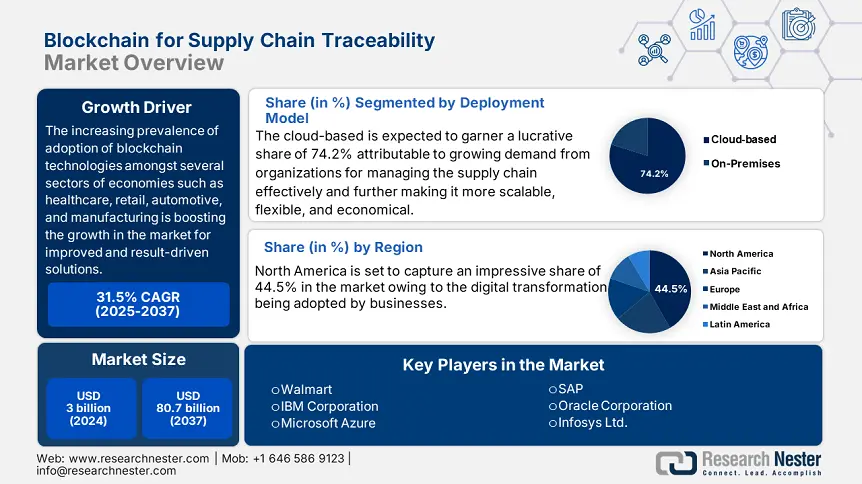
Source: Research Nester
Blockchain’s transparent and auditable nature allows for quick identification of the source of a problem. This facilitates targeted recalls and minimizes the impact on consumers and brands. Further, blockchain-powered platforms enhance collaboration between stakeholders, fostering a shared commitment to quality and enabling swift dispute resolution.
By harnessing blockchain traceability technologies, quality management becomes more robust while improving product integrity and brand reputation.
Companies like Walmart and IBM leverage blockchain platforms to reduce the time needed to trace food origins from days to seconds.
Decapolis improves Food Safety and Quality
Jordan-based startup Decapolis develops food safety and quality traceability solutions. Its platform, Decapolis Food Guard (DFG), utilizes blockchain to record all supply chain-related operations and interactions to ensure the safety and quality of food globally. This aids food producers in adhering to strict safety and quality control standards.
The platform ensures less waste and returned goods, a reduction in certification costs, and improved accuracy in supply chain traceability. This allows consumers to use mobile phones to view the origin of food products and access certification information at each stage, enhancing trust in brands.
Coronet Blockchain ensures Purchasing Quality
South African startup Coronet Blockchain offers blockchain software that focuses on achieving product quality, sourcing quality products, managing procurement, and reaching new markets. Its distributed ledger securely stores transactions and data, retrievable only by authenticated participants. This digital ledger ensures all transactions are authenticated, secure, and verifiable.
The platform’s framework also ensures that all parties in the supply chain are vetted and confirmed reliable before onboarding. It is specifically applicable to the beauty industry supply chain. The platform thus enables manufacturers, distributors, retailers, and consumers to ensure product quality, ethical sourcing, and efficient logistics.
5. Robotic Process Automation
Traditional quality management involves time-consuming and repetitive data entry and documentation tasks, leading to errors and inefficiencies. RPA automates these processes and allows for accurate and swift data handling. This reduces the risk of human errors and frees up human resources for strategic tasks.
Another challenge lies in managing and analyzing vast data generated during quality control processes. RPA enables the processing and analysis of data in real-time, providing valuable insights and identifying trends that improve the overall quality performance.
Additionally, RPA enhances compliance by ensuring consistent adherence to quality standards and protocols, minimizing deviations and associated risks.
Auxiliobits emulates Human Quality Assurance (QA) Tests
US-based startup Auxiliobits offers automation and AI solutions that facilitate the deployment of a digital workforce. The startup offers QA test automation using RPA, which automates test cases that are otherwise executed manually, eliminating errors and enhancing productivity.
This RPA-driven approach ensures increased accuracy in testing, shorter release cycles, and significant savings in manual testing efforts. By leveraging software robots, it emulates human testing behaviors and ensures comprehensive quality checks.
robonext improves Production Planning
Belgian startup robonext develops software robots to automate repetitive business processes. This allows companies to automate tasks involving SAP, Excel, CRM, web browsers, and Citrix.
As a result, the manufacturing industry leverages robonext’s solution to process work orders, plan production schedules, manage safety data, and improve quality reporting.

6. Tech-driven Continuous Improvement
Identifying areas for improvement and implementing changes in a timely manner is critical in maintaining effective product quality. Tech-based continuous improvement tools, such as data analytics and performance monitoring software, enable businesses to collect and analyze data in real time.
They provide valuable insights into production processes and product performance. This approach enables manufacturers to identify bottlenecks, inefficiencies, and quality issues, allowing for swift corrective actions.
Continuous improvement measures ensure consistent adherence to quality standards and protocols across the organization. They also facilitate the automation of quality control processes, reducing the risk of human errors and ensuring compliance.
Further, these technologies foster a culture of continuous learning and improvement by providing employees with actionable feedback and insights. These solutions enable businesses to optimize quality management practices and enhance product quality.
According to Cognitive Market Research, the global continuous improvement tool market size will be USD 38.15 billion in 2024. It will expand at a CAGR of 14.20% from 2024 to 2031.
AI and machine learning algorithms identify minor quality variations well in advance, preventing potential issues. For instance, real-time anomaly detection in manufacturing processes is projected to reduce defects by 30% in 2025.
Juno offers Real-Time Production Resolutions
French startup Juno provides a solution to digitize processes, ensure complete production traceability, and provide real-time access to shop floor data. The startup’s platform allows for the design of systems, task execution at stations, data monitoring and analysis, and continuous system improvement. It facilitates the creation of operational documentation such as standards, operating procedures, and quality controls.
Juno’s platform keeps a continuous check on non-value-added time, increasing the quality rate and decreasing input errors. It specifically provides the electronics manufacturing sector with real-time access to quality data, enabling faster responsiveness to production issues and a reduction in non-compliance rates.
Khenda enables AI-powered Continuous Improvement
US-based startup Khenda develops an AI-powered continuous improvement platform for the manufacturing industry. It automates and digitizes continuous improvement activities to reduce waste and enhance efficiency. The platform features tools that automate cycle time measurements and streamline methods-time measurement (MTM) analysis.
It provides AI-driven video analytics for data visualization and improvement identification. Additionally, Khenda’s solutions allow businesses to create standardized operating procedures, perform digital time studies, and optimize production processes through AI-driven line balancing.
Further, it automatically generates failure modes and effects analysis (FMEA) tables, hazard analysis, and waste analysis. This allows manufacturers to reduce manual efforts, increase efficiency, and make informed, data-driven decisions.
Khenda recently closed its SEED funding round, raising a total of USD 1.75 million to develop solutions for continuous improvement and real-time production monitoring.
7. Big Data & Analytics
The volume of data generated during production and quality control processes makes it challenging to analyze and derive meaningful insights manually. Big data platforms handle and process vast amounts of data and make the raw data ready for extensive processing.
Big data allows quality managers to use extensive historical data sets on multiple parameters to identify potential quality issues and implement preventive measures proactively. Additionally, advanced analytics leverage the cleaned data to provide insights into quality management operations by identifying trends, patterns, and correlations.
This valuable information on raw materials, production processes, and distribution enables businesses to trace and address quality issues quickly. By integrating big data and analytics technologies in quality management, organizations enhance decision-making and improve pattern recognition and anomaly detection.
Bosch created an automotive quality management service framework using Amazon Web Service (AWS) for monitoring production cycles for immediate defect detection.
Big Data in Manufacturing enables Virtual Quality Control
German startup Big Data in Manufacturing specializes in big data for virtual quality control in manufacturing processes. Through its Virtual Quality Control (VQC) system, the startup provides real-time analysis of production data. This enhances efficiency and accuracy in manufacturing.
The platform utilizes machine learning algorithms, big data, and analytics to identify potential defects and inconsistencies, allowing for proactive adjustments. The solution also offers custom solutions to the unique needs of various industrial sectors, including automotive and electronics.
By focusing on data-driven insights and innovative algorithms, the startup is transforming the traditional quality control landscape, offering flexible and precise solutions.
Agmatix advances Agronomic Modeling
Israeli startup Agmatix develops a platform that combines advanced data analytics, machine learning, and agronomic modeling to provide actionable insights to farmers and agronomists. The startup’s Axiom technology offers precise predictions on crop growth, soil health, and weather impact, allowing for optimized decision-making.
The platform also supports the sharing and collaboration of data among various stakeholders in the agricultural ecosystem. This promotes a more cohesive approach to sustainable farming. The solution, in this way, enhances the efficiency and sustainability of agricultural practices.
8. Cloud-based QMS
The decentralization of teams and operations hinders real-time collaboration and data sharing within organizations. Cloud-based quality management solutions provide a centralized platform to facilitate collaboration among teams, suppliers, and stakeholders.
Managing and storing vast amounts of data generated during quality control processes is also another challenge faced by quality managers. Cloud-based systems offer scalable storage capabilities, allowing businesses to securely store and manage large volumes of data without extensive physical infrastructure.
Additionally, cloud-based QMS solutions enable real-time data analysis and reporting, empowering businesses to make informed decisions promptly. Cloud technology thus enables companies to streamline quality management, enhance agility, and achieve higher levels of product consistency. They also enhance compliance and customer satisfaction.
The cloud segment of the QMS market is anticipated to grow with a CAGR of 11% from 2025 to 2030, reflecting increasing demand for flexibility, scalability, and cost-efficiency.
BizReNow Solutions provides Digital Quality Management Systems
Indian startup BizReNow Solutions develops digital quality management system (DQMS) software for businesses. The startup’s cloud-based platform offers tools that facilitate better control over quality processes, including document control, issue management, and audit handling.
By implementing real-time tracking and customizable workflows, the DQMS software streamlines quality management. This makes compliance with various standards and regulations more straightforward. BizReNow Solutions thus enables organizations to enhance their quality management efforts.
Visual QMS compiles Quality Documents
Danish startup Visual QMS offers a quality management system that compiles visual process diagrams, guiding documents, quality standards, and quality management workflows. It provides a comprehensive view of business processes, making it easier for users to understand their daily tasks and the quality requirements associated with them.
The platform’s quality module introduces standardized workflows and automation where they are required, allowing for an easy overview of ongoing activities. This allows quality managers to carry out actions with proper scheduling, reminders, and notifications.
9. Digital Twins & Simulations
The complexity of modern manufacturing processes makes the identification of potential issues and the optimization of product quality difficult and time-consuming. Digital twins offer virtual replicas of physical products or processes. This way, they enable real-time monitoring, analysis, and testing of production workflows and products.
Through simulations, businesses identify weak points, predict potential defects, and optimize production parameters, reducing the risk of quality issues before they arise. Digital twin and simulation technologies also avoid the high cost and time associated with physical prototyping and testing.
Virtual testing reduces the need for physical prototypes, accelerates the development process, and reduces design revisions. Moreover, these technologies enhance the understanding of product behavior under different conditions, leading to data-driven decision-making and improved quality outcomes.
gemineers evaluates Digital Twins for Conformance
German deep tech startup gemineers develops a platform for data-driven quality assurance in manufacturing. The startup’s platform provides a digital twin technology that allows for precise evaluation of products.
The technology captures machine and sensor data to create a digital twin of the manufactured part and presents it in a user-friendly dashboard. The solution allows a reduction in conventional inspection efforts and saves time in ramp-up and series processes.
Duality Robotics offers a Digital Twin Integration Platform
US-based startup Duality Robotics provides a digital twin integration platform for an efficient and connected product lifecycle from design to quality assurance. The startup’s platform, Falcon, utilizes Unreal Engine 5 to provide high-quality synthetic data and 3D simulations.
It enables designers and manufacturing engineers to simulate and test various scenarios in real time. For the manufacturing sector, the platform aids in achieving accurate quality assurance systems by producing synthetic images. This drives more accurate, cost-effective, and faster quality assurance results than real-world data.
10. Zero Waste Strategies
The pursuit of quality often comes with the challenge of minimizing waste and inefficiencies throughout production processes. Maintaining consistent product quality also comes with the challenge of minimizing environmental impact. Zero waste strategies focus on optimizing resource utilization, reducing scrap, and maximizing product yield.
Using data analytics and real-time monitoring, businesses identify areas of waste and take corrective actions promptly. Zero waste quality technologies promote sustainable practices by reducing energy consumption, water usage, and emissions. This leads to more eco-friendly production processes.
Additionally, zero-waste technologies enable businesses to track and trace raw materials to ensure compliance with environmental and ethical standards. Zero waste technologies improve product quality and also contribute to environmental stewardship and enhance brand reputation among environmentally-conscious consumers.
Infera AI supports Zero-Waste Manufacturing Goals
Canadian startup Infera AI offers an AI platform that enhances manufacturing processes by reducing waste in terms of time, energy, and materials. The startup’s approach focuses on achieving zero-waste manufacturing operations using virtual metrology.
Infera AI leverages easily accessible data, such as machinery sensor data, to infer the quality characteristics of manufactured parts without direct measurements. The method ensures high-quality production and also minimizes waste by eliminating the need for excessive physical measurements.
TVARIT enables Waste-minimized Production Processes
German startup TVARIT combines finite element method (FEM) and AI modeling to optimize production processes and realize zero-waste manufacturing. The startup’s approach utilizes synthetic data generation for the inclusion of information that fails to be captured by traditional physical sensors.
TVARIT’s hybrid AI models simulate production processes with precision for foundries and metalworking. For this, the solution considers various factors like geometry, input materials, maintenance data, mold information, and more. This ensures a waste-minimized production process that aids in the achievement of sustainability goals.
Discover all Future Trends in Quality Management
The future of quality management technologies is deeply intertwined with advances in AI, analytics, and IoT. These technologies enable real-time monitoring, predictive analytics, and proactive quality control measures. Machine learning algorithms will further aid the identification of patterns and anomalies in production processes, allowing for immediate corrective actions and minimizing defects.
The Quality Management Trends & Startups outlined in this report only scratch the surface of trends that we identified during our data-driven innovation & startup scouting process. Identifying new opportunities & emerging technologies to implement into your business goes a long way in gaining a competitive advantage.
